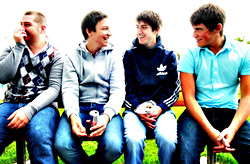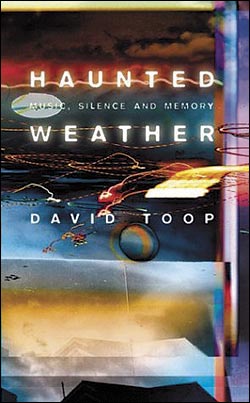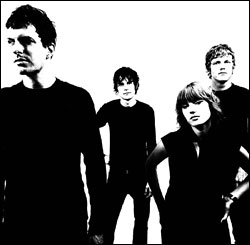Piece of Shit, Promise of Stress, Product of Society, Pissed-Off Stef—call P.O.S. anything you want, as long as it’s not “late for anger.” At 26, Stefon Alexander has way too much time and effort invested in the emotion to warrant such a slight. “It all started when I was in the fourth grade,” the Minneapolis-based rapper explains via mobile from a point just west of Toronto. “One day, we had this substitute teacher. We had him all the time—really cool guy, great teacher. He talked about the Ku Klux Klan, which I didn’t know anything about. I was shocked, really upset. I drew a picture of a Klansman hanging from a tree, a really good picture, I thought. When he saw it, I ended up getting in so much trouble. I didn’t understand why or how I could get in trouble just for drawing a picture of a hanging Klansman.” He pauses. “I’ve been angry ever since.”
Not that Alexander is likely to burst into a crowded bar—or Klan rally—with a loaded Street Sweeper. Between a hip-hop calling that’s got him playing 50 cities in support of second album Audition (Rhymesayers Entertainment) and a mirror gig as guitarist and vocalist for hardcore band Building Better Bombs, Alexander has healthy outlets galore—and a dizzy set of role models. “I’m auditioning for Charles Bronson’s part in Death Wish,” he says casually at the beginning of opener “Ipecac Audition,” between choppy old-school stabs before launching the song proper with, “First of all/Fuck Bush/And that’s the end of it.”
“My DJ, Turbo Nemesis, who’s sitting right next to me in this very van, turned me on to Bronson and the Death Wish movies something like seven years ago,” says Alexander. “Bronson’s a fascinating character in and of himself. He didn’t start acting until fairly late in life; he was, I think, 47 when he made Death Wish. His role is great, too: just an ordinary, mild-mannered guy driven to become this vigilante, again and again. And every time he does, he assumes this alter ego.”
Alexander explores the forces that drove Bronson’s character on “Paul Kersey to Jack Kimball,” part revenge fantasy driven by the hit-and-run murder of his uncle several years ago, part diatribe against apathy. “We throw our hands up/Like we don’t care any more,” he laments on the chorus, his rage cooling quickly over the frosty bed of strings, organ, and electronics that dominate the shambling beat. “It was awful,” he says of the incident. “My uncle was walking across the street to buy his girlfriend a birthday card. This guy hits him, drags him a hundred feet. Nobody comes forward with anything. The guy never turns himself in, that’s that.”
Like Alexander, the track’s producer, Lazerbeak, hails from the Doomtree crew, a close-knit amalgam of rappers, DJs, and musicians whose genre affiliations skew hip-hop-ward without denying rock—hardly unusual in a city where rappers and rockers share bills, beers, and ideas regularly. Audition‘s guest list reflects the crew and scene’s open-armed nature. Sure, Atmosphere’s Slug guests on a couple tracks, a no-brainer given his friendship with the younger MC and position in the Rhymesayers hierarchy. But Bouncing Souls singer Greg Attonito makes an appearance, too, on dual tribute “De La Souls.” And the album’s finest moment belongs to Alexander’s duet with Craig Finn on “Safety in Speed (Heavy Metal),” an extended meditation on celebrity and politics.
“I’ve only walked out of one single movie,” the Hold Steady frontman declaims over a stately, molasses-slow beat. “It was an action-adventure/It was a bloodsucking summer/The posters in the lobby of the theater called it Predator/I called it weak and unwatchable/Carl Withers and two future governors.” As he proceeds, Alexander bobs and weaves around him, weaving abstract arabesques around Finn’s pithy observations.
“I’ve been a fan of Craig’s ever since the first Lifter Puller album,” says Alexander, who embraced punk rock at 10 and started rapping a year later, “and we’ve been talking about doing something together for a long time. I flew to New York just to write the song with him. We wrote the first half at his place and finished it at a coffee shop. He’s so great to work with. The way he plays with identities just amazes me, the whole carnival barker as arena rocker as club dude as secret raver thing. And beneath all the roles, there’s always something very honest, very real.”
You could say something similar about Alexander. His screens aren’t as iridescent as Finn’s; they don’t have to be. Bronson works fine for now, when he needs one—which isn’t all that often. Atypical guests and the occasional rock-derived sample only help underscore the rapper’s unusual place in indie hip-hop: a regular guy who prefers dwelling on personal and social particularities to blathering about game elevation. “I try to keep my rock and hip-hop sides as separate as possible,” he says, “but my beacon is still Minor Threat. If what I make is as honest as what they did—as complete in itself—I feel that I’m doing OK.”








